
The Hand of Merlin from developer Room-C Games, Croteam, and publisher Versus Evil is one of those odd little games that tends to slip by most players. It released recently onto consoles after finishing it’s purgatory in Steam Early Access with little fanfare and the average gamer likely never heard a peep about it. That’s not a surprise for an indie game with the flooded market we’ve got these days though.
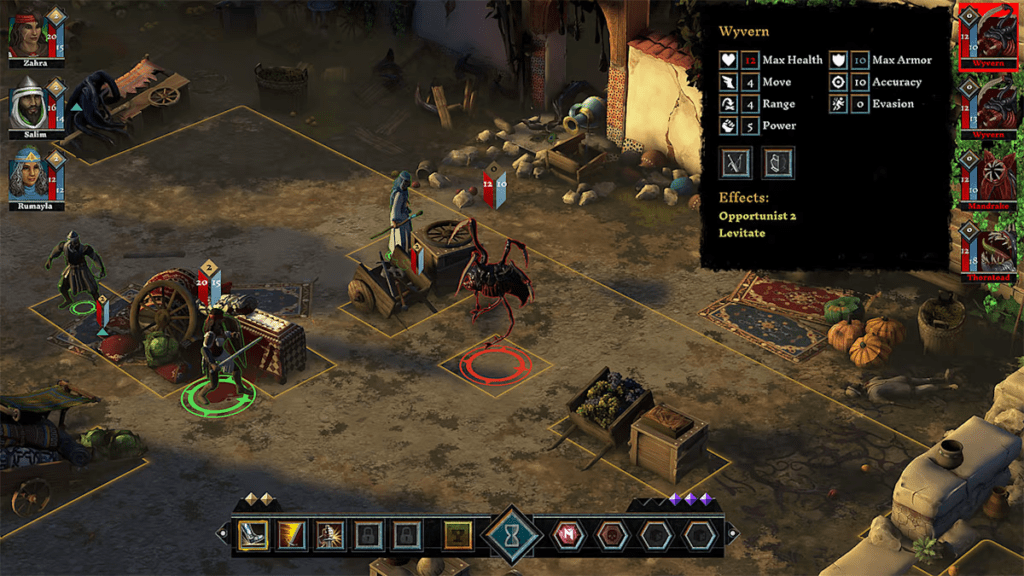
But what exactly is it? Arthurian obviously, with Merlin right there in the title but that doesn’t narrow things down much. What you’re really looking at is an oddly unique combination of Arthurian legends, rogue-like gameplay, and gamebook mechanics, combined with an X-Com style tactical interface. In other words, The Hand of Merlin is a mutt.

How do all those disparate elements fit together, you ask? Well, it’s actually a bit complicated. Merlin himself has asked you to undertake a quest to bring the Holy Grail to Jerusalem. But there’s more going on as Merlin is a being that is trying to navigate the multiverse in order to save reality and…wait, we’ve heard this stuff before. There’s a noticeable science fiction bent to the introduction of The Hand of Merlin and that’s all well and good but it doesn’t really show itself much in early gameplay. After a remarkably odd and interesting introduction, you’re kind of tossed into the pool with all your clothes on so to speak. As a small group of adventurers, you will take the Grail from England to the Middle East in order to save the world and what not.
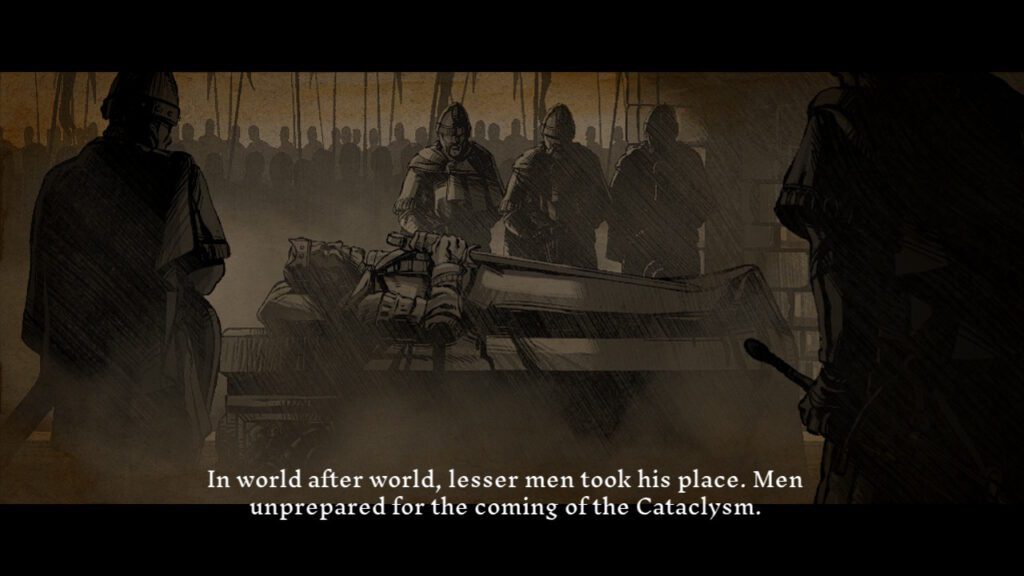
What’s weird about The Hand of Merlin is that after all that exposition, the gameplay doesn’t really have a strong narrative flow. You’re given a starting group of three characters, a map with a bunch of node points on it, and well, very little direction. Simply pick a point, move there, and follow the prompts. Sometimes that means you answer a riddle or talk to a random person, all shown in the style of gamebook-type games such as Steve Jackson’s Sorcery! or Omen Exito: Plague (review here). These segments are randomized in a rogue-like manner, allowing you to complete tasks and eventually unlock new starting story elements, even if your base characters don’t power up.
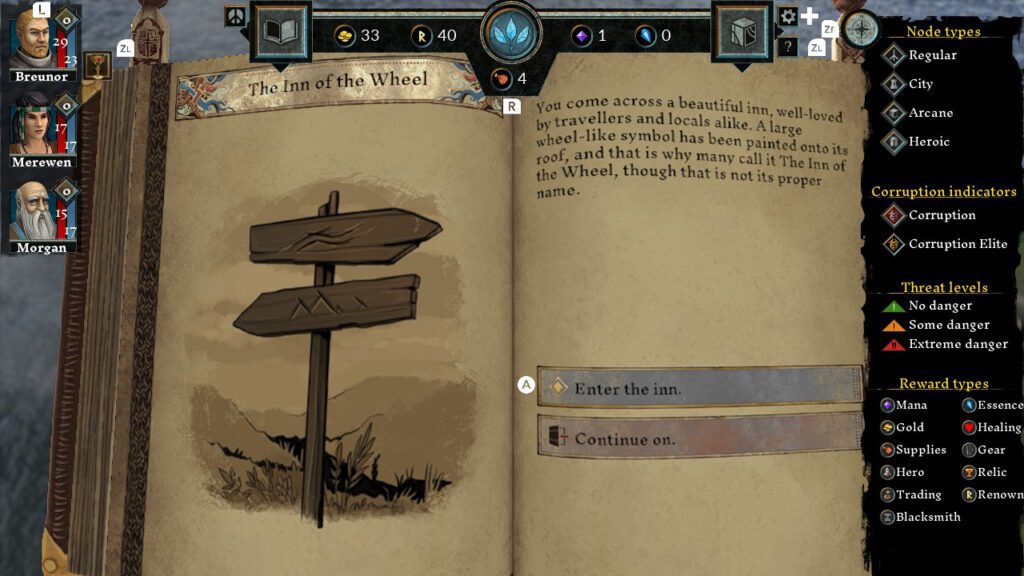
But sticking with just one or even two genres wasn’t enough for the devs over at Room-C. Some nodes are corrupt, forcing you to encounter enemies. That’s when the game shifts to an isometric strategy game. Your three characters are on the board along with some enemies which you must defeat to proceed. If you have ever played X-Com or anything like it, you’ll be pretty at home here, but that doesn’t mean that this is a solid strategy game.
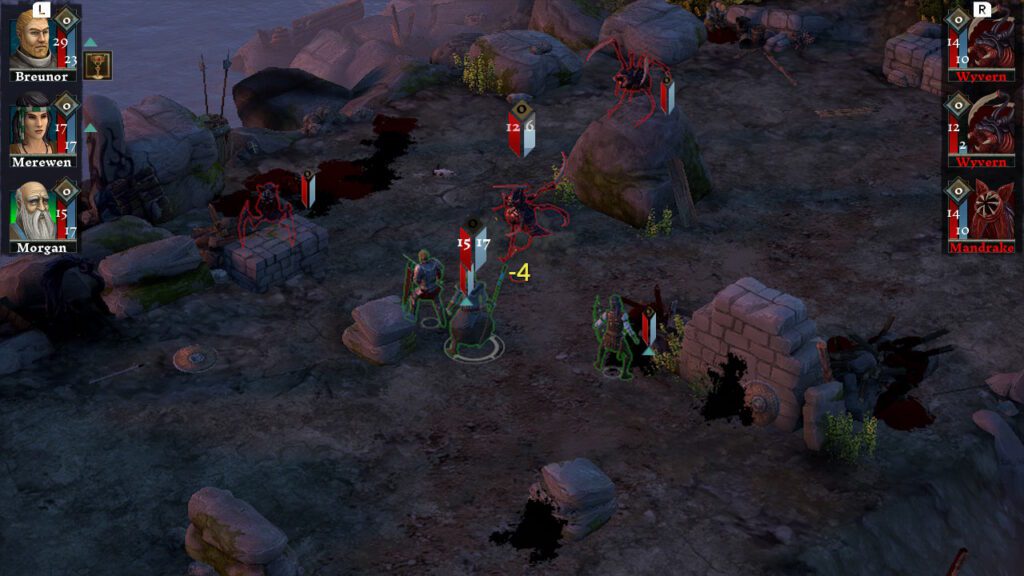
During combat, it’s difficult to move around, partly because the perspective is locked and you can’t rotate the map and partly because you have limited movement points and often can’t do much. Most battles start far from enemies and force you to waste time travelling across the map. Usually that’s not a problem but in The Hand of Merlin, you generally end up either sitting back to try and grab a first strike on the enemies or moving a bit too far forward and getting pummelled. If you’re on normal difficulty, you’ll get obliterated too, because enemies do massive damage in comparison with your weak attacks and you simply don’t have much chance. That wouldn’t be a problem if you healed after every battle like a normal game but that definitely doesn’t happen here. You’ll have to plan ahead strategically, although this being a strategy rather than a requirement that can be attributed to bad game design is something to be discussed.

Regardless, you’ll end up zipping around the terrain using your mage, archer and fighter to mop up your opponents and clear the nodes. Eventually, you’ll find other, more powerful characters and swapping them out will net you more power for your travels. Since this is a roguelike though, think more in terms of runs than playing through a story. That’s both a strength and a weakness for The Hand of Merlin as the resetting of the story makes you feel like you’ve wasted your time but the variety is interesting with a new story each run.

That’s a lot of disparate gameplay elements, right? Well, we’re not done yet. Some story elements in The Hand of Merlin also contain card-based challenges within the gamebook segments. You’re given a number of cards and must select one in order to proceed. Cards are flipped face down and you’re given the percentage chance of success at the start. Choose wisely and you’ll likely get a boon or a positive event will happen. Choose poorly and it might be game over for you (but it usually isn’t).
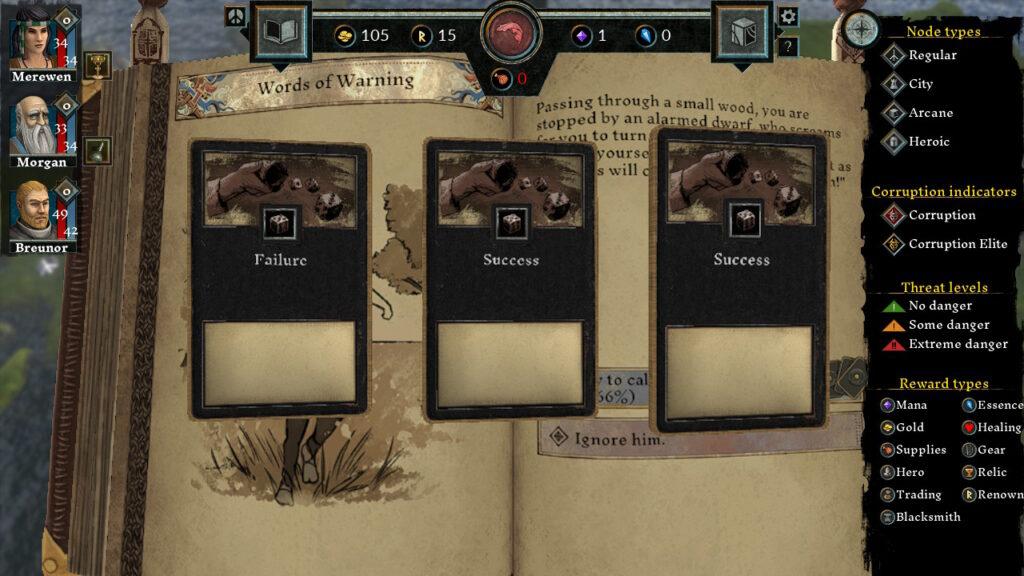
Eventually you’re going to skip your way all about the map, fighting, talking, and generally adventuring and by this point, chances are high that The Hand of Merlin feels somewhat repetitive. That’s probably because it is and the lack of action coupled with the randomized story create an overall feeling of indifference for players. The story doesn’t really matter if you’re going to have to start over either way and unlike a game like Steve Jackson’s Sorcery!, there’s simply not a feeling of flow and progression. Instead the game feels like you’re simply trying to play for no reason. There’s no real incentive to help Merlin out. There’s not even any real incentive for being a good person and making good choices.
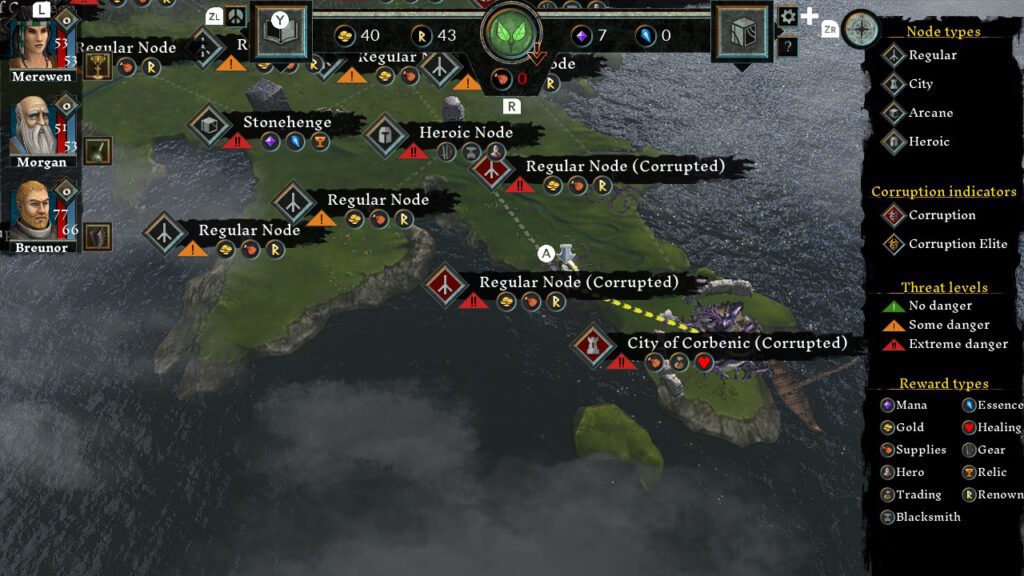
And all that is before we discuss the Switch controls for The Hand of Merlin. On the Switch, this game is a nightmare to play. The controls are unresponsive, the gameplay is tedious and the screen text is particularly small (even with glasses on). In fact, it’s difficult to play on the Switch at all between the extensive load times (you’ll think your Switch is broken when the game boots up), confusing button mapping, and complete lack of touch controls (which really should have been included). Menus pop up at random even when you try to shut them off and the entirety of the interface feels like a PC port that’s been shoved onto the Switch and forced to run.

Sure, the visuals are all right in The Hand of Merlin, but they definitely could have been better. Generic fantasy portraits make up each character, feeling like an old PC game, but there’s no animation, nothing to set them apart, and honestly, you don’t really care about your characters. The gamebook portions of the game suffer from weird curvature to make the visual presentation look more like a real book but especially on an undocked Switch, this just makes for less friendly reading. Combat arenas seem uniformly dark and limited and detail is almost completely invisible on the undocked Switch, reinforcing the converted PC feel of the game. The music is decent but generic and you’re not going to be craving the soundtrack to listen to on long car rides, but there’s really nothing wrong with it. In fact, both the visual design and sound design feel like they’re trying to overcome the design of the game.

The Hand of Merlin suffers from a cardinal flaw of game design. It’s trying way too hard. By including all of these disparate elements and trying to link them together, something is lost. That ephemeral fun factor disappears when you’re constantly fighting menus with controls that aren’t intuitive, rogue-like gameplay that doesn’t let you get stronger, an overachieving plot that rarely comes to fruition, and fairly unforgiving strategy combat. By the time you lose and restart a few times in The Hand of Merlin, your engagement level is already dropping and a few hours after that, many players will find they’re just done with the game. The complexity of this high concept medley of game styles is simply a bit too much and the majority of gamers aren’t going to be wowed by The Hand of Merlin, especially for $30. If the concepts appeal to you, this might be one worth checking out on sale but as it stands, without some serious re-balancing and tweaking for the Switch, maybe skip The Hand of Merlin until it goes on sale.

This review is based on a digital copy of The Hand of Merlin provided by the publisher. It was played on a Nintendo Switch in both docked and undocked modes and was noticeably harder to play in undocked mode. The Hand of Merlin is also available for PS4, PS5, XSX, and PC on Steam and GOG.

